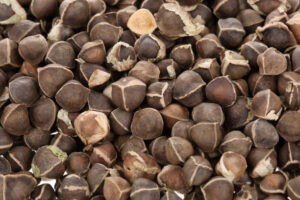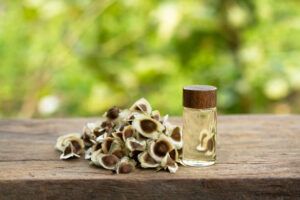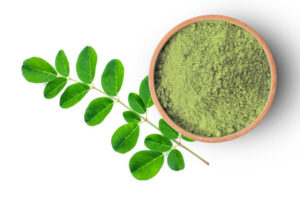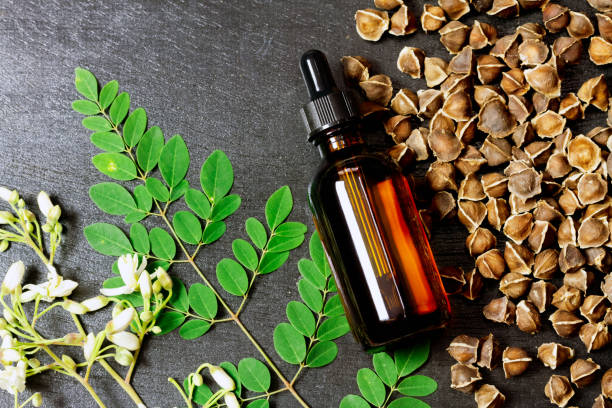Moringa Oleifera, a tree native to parts of Africa and Asia, has been hailed as a “miracle tree” due to its nutritional and medicinal properties. Its leaves, bark, flowers, fruit, seeds, and root are used to make medicine, showcasing the tree’s versatility. Among these, moringa seeds have gained global recognition for their unique benefits. Rich in vitamins, minerals, and essential amino acids, these seeds serve not only as a powerful nutritional supplement but also play a vital role in traditional medicines across various cultures.
This comprehensive guide aims to explore the plethora of benefits offered by moringa seeds, their nutritional profile, and their potential impact on health and wellness. Whether you are a health enthusiast looking to explore the benefits of moringa seeds or someone interested in natural remedies for various health conditions, this article will provide you with in-depth insights into integrating moringa seeds into your wellness routine.
Table of Contents
Toggle- What Are Moringa Seeds?
- Nutritional Profile of Moringa Seeds
- Health Benefits of Moringa Seeds
- How to Use Moringa Seeds
- Growing and Harvesting Moringa Seeds
- Cultivating Your Own Moringa Seeds
- Tips for Harvesting and Storing Moringa Seeds
- Potential Side Effects and Considerations
- When to Avoid Moringa Seeds
- Possible Side Effects
- Sustainability and Ethical Considerations
- Moringa Seeds and Environmental Impact
- Ethical Considerations in Commercial Production
- Conclusion
- FAQs About Moringa Seeds
What Are Moringa Seeds?

Moringa seeds are the seeds derived from the pods of the Moringa Oleifera tree. They are round or oval in shape, with a hard brownish outer shell. Inside, the seeds are white and soft when fresh, becoming harder as they dry. Traditionally used for their medicinal and nutritional properties, these seeds are now recognized globally for their health benefits.
- Origin: Derived from the Moringa Oleifera tree, also known as the drumstick tree.
- Characteristics: Round or oval, with a hard outer shell and a soft inner part when fresh.
Nutritional Profile of Moringa Seeds
Moringa seeds are a powerhouse of nutrition, containing a variety of vitamins, minerals, and other essential nutrients that contribute to their health benefits.
- Key Nutrients:
- Vitamins: Rich in vitamins A, B (B1, B2, B3), C, and E.
- Minerals: High in minerals like calcium, potassium, iron, magnesium, phosphorus, and zinc.
- Other Nutrients: Contains essential amino acids, antioxidants, and anti-inflammatory compounds.
- Comparison with Other Superfoods:
- Moringa seeds vs. Chia Seeds:seeds of moringa contain higher levels of vitamins A and C, calcium, and iron.
- Moringa seeds vs. Flax Seeds: Flaxseeds are a good source of Omega-3 fatty acids, whereas moringa seeds excel in vitamin content and mineral diversity.
Health Benefits of Moringa Seeds
Boosting Immune System with Moringa Seeds
Moringa seeds are renowned for their ability to enhance the immune system’s function. Thanks to their high vitamin and mineral content, these seeds can significantly bolster the body’s defenses against various health issues.
- Role of Antioxidants: Packed with antioxidants such as vitamin C, seeds of moringa help combat free radicals, reducing oxidative stress and preventing cellular damage.
- Essential Nutrients: The presence of essential nutrients in seeds of moringa supports the overall functioning of the immune system, ensuring the body can efficiently fight off infections.
Moringa Seeds for Diabetes Management
The impact of seeds of moringa on diabetes management has been a subject of various studies. These seeds can help regulate blood sugar levels, making them a valuable dietary addition for people managing diabetes.
- Blood Sugar Control: seeds of moringa may help lower blood sugar levels, improving insulin sensitivity.
- Research Evidence: Studies suggest that consuming seeds of moringa can lead to significant improvements in blood sugar control among diabetic patients.
Weight Loss and Moringa Seeds
Incorporating seeds of moringa into your diet can also aid in weight management, thanks to their high fiber content and nutritional profile.
- Effects on Metabolism: The seeds can help boost metabolic rate, aiding in more efficient calorie burn.
- Dietary Fiber: High in fiber, seeds of moringa promote a feeling of fullness, reducing calorie intake and aiding in weight loss.
Moringa Seeds and Heart Health
The cardiovascular benefits of seeds of moringa are noteworthy. They can assist in lowering cholesterol and lowering the chance of developing heart disease.
- Cholesterol-Lowering Effects: seeds of moringa contain compounds that can help lower LDL (bad) cholesterol levels.
- Heart Health Improvement: By preventing plaque formation, seeds of moringa contribute to better heart health and reduced risk of heart disease.
Anti-inflammatory and Antimicrobial Properties
Moringa seeds possess significant anti-inflammatory and antimicrobial properties, making them beneficial in treating and preventing various conditions.
- Anti-inflammatory Benefits: The seeds can reduce inflammation, benefiting conditions such as arthritis and other inflammatory diseases.
- Antimicrobial Effects: seeds of moringa have been shown to fight against certain pathogens, providing a natural way to enhance body resistance to infections.
How to Use Moringa Seeds
Consuming Moringa Seeds
- Safe Consumption Practices:
- Start with a small number of seeds (1-2) per day to assess tolerance.
- Remove the outer husk before consumption.
- Recommended Daily Intake:
- Adults can consume 3-5 seeds daily after a tolerance test period.
- For individualized guidance, speak with a healthcare professional, particularly if you have underlying medical issues.
- Potential Side Effects:
- Overindulgence may result in digestive problems including gas and bloating
- Pregnant and breastfeeding women should avoid consuming seeds of moringa due to a lack of research on its safety in these groups.
Moringa Seeds in Cooking
Moringa seeds can be a nutritious addition to various dishes, offering both flavor and health benefits.
- Recipes Incorporating Moringa Seeds:
- Moringa Seed Tea: Crush a few seeds, steep in hot water, and strain.
- Salads: Add roasted or cooked seeds of moringa to salads for a nutritional boost.
- Smoothies: Blend powdered seeds of moringa into your morning smoothie.
- Preparing Moringa Seeds for Cooking:
- Roasting: Roast moringa seeds lightly to enhance their nutty flavor.
- Boiling: Boil moringa seeds for a few minutes to soften them, making them suitable for adding to dishes.
Moringa Seeds as Supplements
For those who prefer not to consume the seeds directly, seeds of moringa are available in various supplement forms.
- Different Forms of Moringa Seed Supplements:
- Powder: Ground seeds of moringa can be taken in capsule form or added to drinks.
- Oil: Moringa seed oil is used for its skin benefits and can also be consumed for its health properties.
- Who Should Consider Moringa Seed Supplements:
- Individuals seeking to boost their nutritional intake without altering their diet significantly.
- Those with specific health goals, such as improving heart health or managing diabetes, may find moringa seed supplements beneficial.
Growing and Harvesting Moringa Seeds
Cultivating your own seeds of moringa can be a rewarding process, providing a sustainable source of this nutritious superfood right in your backyard. Here’s how to grow and harvest seeds of moringa effectively.
Cultivating Your Own Moringa Seeds
- Climate Requirements:
- Moringa Oleifera thrives in warm, subtropical, and tropical climates.
- It’s tolerant of poor soil but prefers well-drained sandy or loamy soil.
- Planting:
- Seeds should be planted 1 inch deep in pots or directly in the ground.
- Space the plants 7-10 feet apart to allow for growth and airflow.
- Watering and Care:
- Water the seedlings regularly but avoid waterlogging as moringa dislikes wet feet.
- Prune regularly to encourage bushy growth and more leaves, which leads to more seeds.
Tips for Harvesting and Storing Moringa Seeds
- When to Harvest:
- Moringa seeds are ready for harvest when the pods turn brown and dry on the tree.
- Harvest the pods before they open naturally to avoid losing seeds.
- How to Harvest:
- Cut the pods from the tree using pruning shears.
- Dry the pods in a clean, dry area until they crack open, revealing the seeds of moringa inside.
- Storing Moringa Seeds:
- Store seeds of moringa in a cool, dry place inside airtight containers.
- Properly stored, seeds of moringa can remain viable for planting for up to a year, and even longer for nutritional and medicinal use.
Potential Side Effects and Considerations

While moringa seeds offer a wide range of health benefits, it’s important to be aware of potential side effects and considerations for certain groups of people.
When to Avoid Moringa Seeds
- Pregnant Women: Due to the potential for uterine contractions, pregnant women should avoid consuming seeds of moringa.
- Breastfeeding Mothers: There is insufficient research on the effects of seeds of moringa during breastfeeding, so it’s best to err on the side of caution.
- Medication Interactions: Moringa seeds can potentially interact with medications, including those for diabetes and high blood pressure. If you are on medication, speak with your healthcare practitioner.
Possible Side Effects
Consuming seeds of moringa in excessive amounts can lead to:
- Digestive Issues: Including bloating, gas, and diarrhea.
- Low Blood Pressure: Due to their potential to lower blood pressure, consuming seeds of moringa in large quantities could cause hypotension in some individuals.
- Hypoglycemia: Overconsumption may lead to dangerously low blood sugar levels, especially in individuals with diabetes.
Sustainability and Ethical Considerations
The cultivation and consumption of seeds of moringa not only have health benefits but also carry significant environmental and ethical considerations. Sustainable practices and ethical sourcing are essential to maximizing the positive impact of seeds of moringa.
Moringa Seeds and Environmental Impact
- Water Use: Moringa Oleifera is drought-resistant, requiring significantly less water compared to other crops, making it an environmentally sustainable choice.
- Soil Conservation: The deep root system of the Moringa Oleifera tree helps in preventing soil erosion, enhancing soil health.
- Carbon Footprint: Growing moringa trees contributes to carbon sequestration, reducing the carbon footprint.
Ethical Considerations in Commercial Production
- Fair Trade Practices: When purchasing moringa seeds or products, look for fair trade certifications to ensure farmers receive fair compensation.
- Supporting Local Communities: The moringa industry can provide economic benefits to local communities if sourced ethically, supporting local agriculture and sustainability.
- Biodiversity: Sustainable farming practices of moringa contribute to biodiversity, promoting the growth of various plant and animal species.
Conclusion

Incorporating moringa seeds into your diet offers a simple yet effective way to enhance your overall health and wellness. With their rich nutritional profile and a wide array of health benefits, these seeds can be a valuable addition to any lifestyle. Whether used in cooking, consumed as a supplement, or even grown at home, seeds of moringa provide an accessible means to boost nutritional intake and address specific health concerns.
- Top Benefits Recap:
- Immune system support
- Diabetes management
- Weight loss aid
- Heart health improvement
- Anti-inflammatory and antimicrobial properties
- Balanced Approach:
- While seeds of moringa are beneficial, they should be part of a balanced diet.
- Consulting with healthcare providers is recommended, especially for those with pre-existing health conditions or those taking medications.
FAQs About Moringa Seeds
To further aid in understanding and integrating these seeds into your wellness routine, here are answers to some common questions:
- Q: Can seeds of moringa be eaten daily?
- A: Yes, in moderation. It’s recommended to start with a small quantity and gradually increase to the advised daily intake.
- Q: Are there any people who should avoid moringa seeds?
- A: Pregnant women, breastfeeding mothers, and individuals on certain medications should consult a healthcare provider before adding seeds of moringa to their diet.
- Q: How do moringa seeds compare to other superfoods?
- A: seeds of moringa stand out due to their unique nutritional profile, offering a wider range of vitamins and minerals than many other superfoods.
Embracing moringa seeds as part of your wellness routine can contribute to improved health and well-being, underlining the importance of natural, nutrient-rich foods in maintaining a healthy lifestyle.
READ ALSO:
5 Unbeatable Benefits of Vitamin D3 for Immune Function: Boost Your Defense Today!
The Immune Boosting Power of Vitamin C: Unveiling Its Remarkable Benefits
Unveiling the Wonder – Benefits of Vitamin B6 for Mood Regulation
